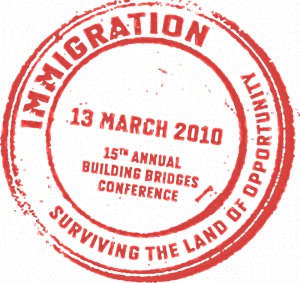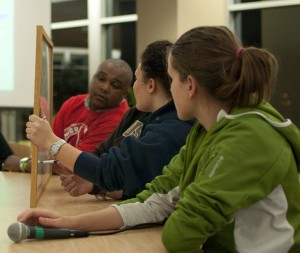
On Saturday, March 13, 2010 Gustavus is hosting the 15th annual Building Bridges Conference. This year’s theme is “Immigration: Surviving the Land of Opportunity.” The conference will focus on the obstacles immigrants face upon their arrival, as well as the daily struggles of adjusting to life in the United States.
“Immigration is hugely important for a whole variety of reasons,” Assistant Professor of Religion Thia Cooper said, “From the migrant perspective, it’s important to learn about why people leave their homelands, what their journeys are like and what their experiences of the USA are … They become part of the fabric of the USA, part of what it means to be an American. This is important from the host perspective, the perspective of those of us who already live here and have been here for a month, or a year, or a generation or two or three. As soon as we arrive, we become the ‘hosts.’ We have to figure out who to welcome and when and how to live with one another. And, of course, none of this is simple.”
The Building Bridges committee works to choose a pertinent theme each year, and they felt that this year’s topic was of special importance.
“[Immigration is an important topic] because most everybody here, unless you’re Native American, comes from a line of immigrants,” Junior Health Fitness Major and Building Bridges Co-Chair Maya Jayawardena said. “It’s important for everyone to understand how immigrants come in today. We want to show where they’re coming from and what they go through when they get here.”
This year’s keynote speakers are Kao Kalia Yang, author of The Latehomecomer: A Hmong Family Memoir, and Dr. Paul Hillmer, a professor of history at Concordia College–St. Paul.

Yang, a Hmong American, immigrated from Thailand with her family after spending the first seven years of her life in a refugee camp.
After graduating from Carleton College with a bachelor’s degree in American studies, women’s and gender studies, and cross-cultural studies, Yang received a Master of Fine Arts in creative non-fiction Writing from Columbia University in New York City.
“Kalia stands out because her book, it is really beautifully written and powerful. [It is] about her family’s journey here to the United States and what struggles they faced when they got here,” Senior Communication Arts and Literature Teaching Major and Building Bridges Co-Chair Rebekah Schulz said. “[The book] helped us to frame this conference and the positive and negative aspects faced by immigrants. It helped to inspire our conference name.”
In complement to Yang is Dr. Paul Hillmer, the organizer of the Hmong Oral History Project and author of A People’s History of the Hmong. In 2006, Dr. Hillmer was awarded a “Save Our History” grant by the History Channel and with it created a six-part documentary focusing on the resettlement of Hmong families in the Twin Cities. “[Paul and Kalia] work together well because Kalia talks about her personal experience and Paul brings in the other side, since his family came here generations ago,” Schulz said.
The decision to focus on Hmong immigrants in the keynote was deliberate, but according to Schulz, still required much thought. “We struggled because we didn’t want to make it just about one group of immigrants. But, in the end, we figured someone who talked about a specific experience would be more powerful than someone who didn’t have a personal immigration experience,” Schulz said.
Cooper pointed out that there are many Hmong immigrants in our own state. “In Minnesota, our population is growing and becoming more diverse because of our influx of migrants. The Hmong are one group, among many others, who have settled here and are now part of what it means to be Minnesotan.”
“It brings the issue home for the students.” Jayawardena said.
Saturday’s events kick off with registration at 9:00 a.m. in the Campus Center, followed with the keynote address at 10:00 a.m. in Christ Chapel. Before the keynote speakers, the social justice theater campus group “I Am, We Are” will be performing as part of the introduction. “Every year, ‘I Am, We Are’ is a really big help. They start off the introduction and come up with portrayals of different stories or experiences with immigration. They always brainstorm from their own experiences or from the experiences of people they know,” Jayawardena said.
“It forms a good backdrop for the keynote address. They talk about the things that are hard to talk about, which people will then have in their head when they listen to the keynote,” Schulz said.
After a lunch break at 12:30 p.m. a series of hour-long afternoon workshops begins at 1:30 p.m, with each focusing on different aspects of immigration and the lives of immigrants. “While the keynote is Hmong, the workshops focus on all different groups of immigrants,” Jayawardena said.
One workshop, titled “Through the Eyes of an Immigrant,” will give attendees the chance to hear the immigration stories of Gustavus students and faculty, as well as local residents. Another workshop, “Immigrants in Minnesota and the Refugee Experience,” will provide information on immigration laws in Minnesota and the United States, debunk myths and validate facts related to immigration and immigrants and explain how immigration to America has changed over time. A third workshop, “No Second Chance,” brings a representative from the Immigration Law Center to the conference to discuss the legalities of immigration, and how a person’s immigrant status can affect whether or not he or she will be deported. In addition, there will also be a Keynote Q&A with Yang and Hillmer.
Other activities lined up for the afternoon include an Action Piece at 3:30 p.m. which allows attendees to actively participate by making care packages for immigrant families, writing letters to Congress about three aspects of immigration that need to be addressed, or donating money for a scholarship to be given out to an immigrant student graduating from St. Peter High School. There will also be a formal walk-through set up in Alumni Hall that gives participants a chance to see firsthand an immigrant’s story.
“It’s similar to the Holocaust Museum [in Washington, D. C.], where you get a passport and follow the journey of an actual immigrant story as you walk through. We make it as realistic as possible, so many immigrant stories end with deportation.” Jayawardena said.
In recent years Building Bridges has tackled large current issues in the United States and around the globe, such as education and genocide. “It reminds us that we aren’t just a little bubble on top of our hill. It brings real-world issues to us,” Senior English Major Sam Maranell said, who has attended the past three Building Bridges Conferences and plans to attend again this weekend. “This year is especially exciting because people from our community are being recognized.”
“I think it’s important [to attend] because this conference is organized by students on a topic of their choosing, so in that way it’s about supporting your own work,” Cooper said. “Second, I think it’s an incredibly important and complex topic and the conference organizers have chosen some interesting ways for us to learn more about it.”
Ultimately, this year’s Building Bridges student organizers are hoping to increase awareness about immigration, as well has help students, faculty, and other Building Bridges attendees realize how much immigration affects our country. “We started researching this topic in May, and now [it seems as if] immigration pops up in my classes, in my text books,” Schulz said. “We started researching this topic in May, and now [it seems as if] immigration pops up in my classes [and] in my text books [all the time]. Our country is a country of immigrants.”
Is there any video or other record of the proceedings available for public consumption?